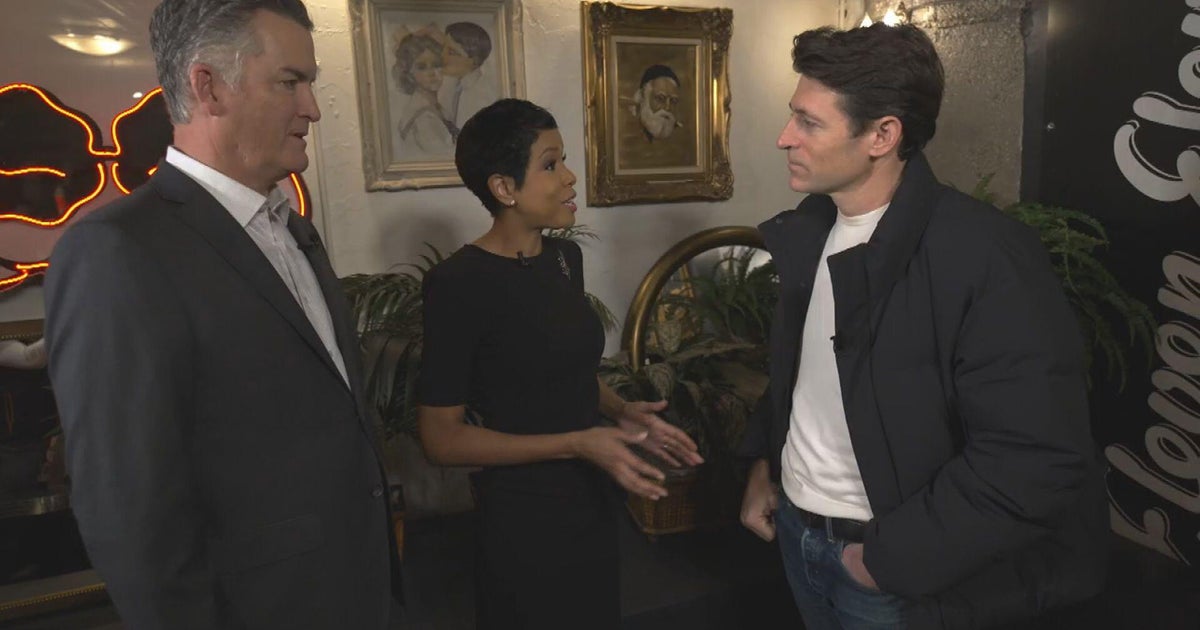Bold Stage Drama? 'Frozen' Onstage? Just Get Liesl Tommy.
Follow CBSMIAMI.COM: Facebook | Twitter
NEW YORK (AP) — Going from a harrowing stage play about sex slaves in a hut in a war-torn African country to the icy, lyrical Disney world of "Frozen" would be far too much of a stretch for most directors, but not Liesl Tommy.
The South African-born director has capped a remarkable season for nurturing "Eclipsed" on Broadway — and earning a directing Tony nod — while also opening a $28 million musical on the West Coast featuring a multiracial Elsa and Anna. What attracted Tommy to each was simple: a good story.
Eclipsed is nominated for six Tony Awards. Watch the award ceremony Sunday, June 12th at 8 E.S.T. on CBS4.
"My wheelhouse is really visceral, intense storytelling," she said. "I want the audience to lean forward and forget that they are watching a play. I want them to feel like they have a window into actual real lives of people that they didn't have before they walked into the theater."
Tommy finds herself the only female among 10 candidates honored with Tony nominations for director in the drama or musical categories. The Tonys will be presented Sunday night.
"It's just so boring that we are still having this conversation," she said. "It comes down to people in positions of power. They just have to be more rigorous about their choices."
Tommy is making the most of hers, starting with "Eclipsed," the first Broadway play to feature a director, writer and cast that are all black and all women.
Tommy has been directing it in various incarnations since playwright Danai Gurira showed her a first draft in 2009. It currently stars Oscar-winner Lupita Nyong'o as a captive girl forced to decide her future — subjugation, war or peace.
The tale isn't typical Broadway fare, and before the show moved to its home at the Golden Theatre, Tommy loosened the thick Liberian accent in the first scene to acclimate the audience. She elevated the humor to create "a real roller coaster of emotion" and added 60 speakers throughout the theater so everyone could feel like they were in the compound.
Producing team Stephen C. Byrd and Alia Jones-Harvey, who push for diverse subjects and audiences onstage, called Tommy a genius. "She never let us see her sweat. For this to be her Broadway debut, she handled all of the obstacles that were put in her way," said Jones-Harvey.
Tommy, who moved to Massachusetts when she was 15, studied acting at a joint program at Brown University and Trinity Repertory Company. She started out as an actress, but grew impatient with the roles she was offered.
"I think I was born to direct and I didn't realize it," she said. "I felt really strongly that if I was going to make a life in the theater, I would have to have more political work," she said.
She has directed everything from "Hamlet" to a "Les Miserables" updated with handguns and business suits. It was the way she deftly handled the emotional intensity among women in a production of Lynn Nottage's "Ruined" at the La Jolla Playhouse in 2010 that got her the call from Disney.
She was asked to direct the musical "Frozen" at the 2,000-seat Hyperion Theater at Disneyland, which has up to five shows a day and can be seen by up to 10,000 people a day.
"When I first got that call, I thought, 'They have the wrong Liesl Tommy.' I thought maybe there was another person they meant to call. But they meant to call me," she said.
She began, as she always does, with an attempt to get into the heart and mind of the writer. Then she hired a top creative team that was also extremely diverse. She insisted on that diversity onstage as well, with actors of all racial backgrounds playing princes, princesses and villagers.
"Disney is very strict about its character representation, but when you walk through the park and you see all of those different little children — no matter what their race is — wearing a little princess costume, you can see it doesn't matter to them," she said. "And so I felt like it shouldn't matter to us."
Tommy dug in her heels and to Disney's credit, it eventually agreed. So, a few months ago, as a young African-American actress sang "Let It Go," stage managers and crew members came up to her sobbing, reduced to blubbery tears.
"They knew they were witnessing history," said Tommy. "The intensity of their support was very powerful. I realized that people really need ways to feel like they're on the right side of things."
(© Copyright 2016 The Associated Press. All Rights Reserved. This material may not be published, broadcast, rewritten or redistributed.)







